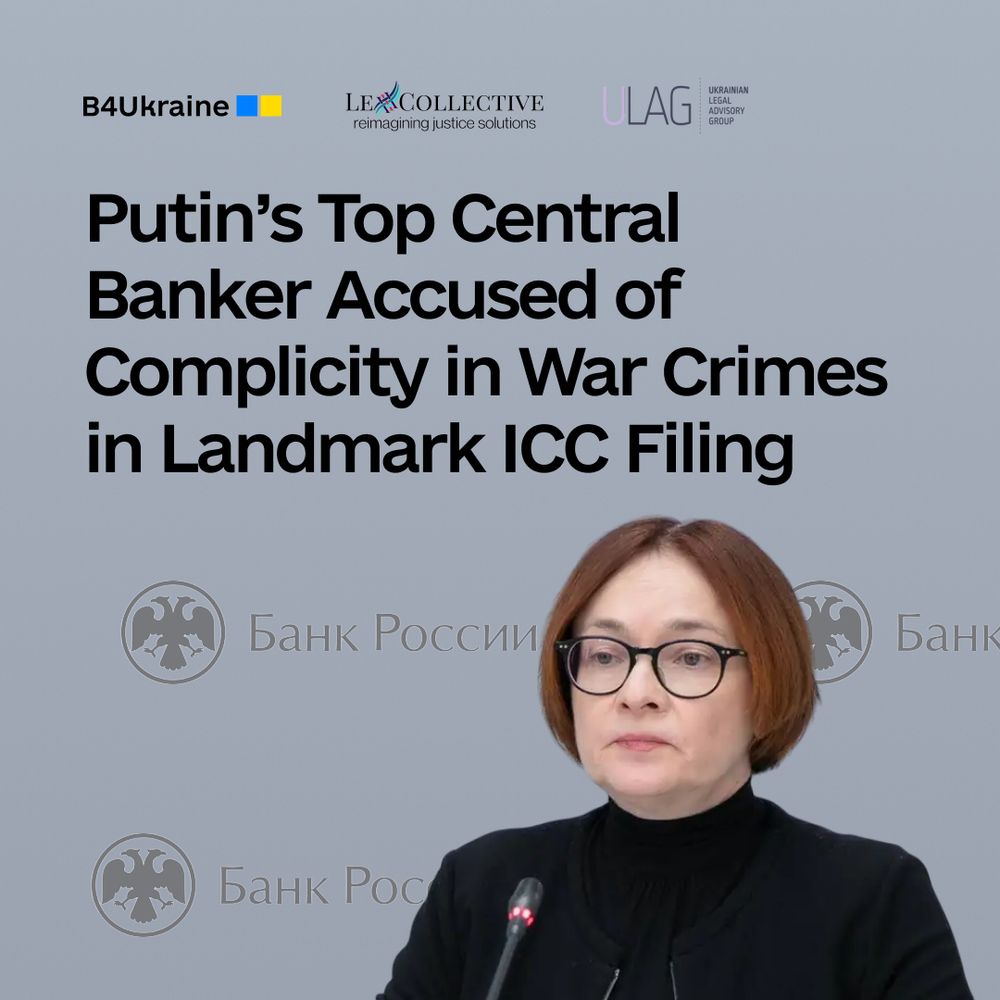
Coalition alleges that Russian central bankers, finance minister, and banking executives are complicit in crimes against humanity and war crimes in occupied Kherson Oblast.
LexCollective, with support from B4Ukraine and the Ukrainian Legal Advisory Group, has filed a landmark Article 15 Communication with the Office of the Prosecutor of the International Criminal Court (ICC) in The Hague, highlighting the alleged roles of senior office holders from Russia’s Central Bank, the Ministry of Finance, Russian-controlled banks, and the Kherson occupation administration in systematic atrocity crimes against Ukrainian civilians in occupied Kherson Oblast.
Unprecedented Legal Action Against Financial Enablers
The Communication represents the first comprehensive legal filing specifically targeting the financial architecture of Russia’s illegal occupation. It alleges that Russia’s Central Bank Governor and Deputy Governor, the Russian Minister of Finance, the head of the Kherson Russian-installed military-civil administration, and executives from Russian-controlled banks are complicit in the crime against humanity of persecution and war crimes, including wilfully causing great suffering to Ukrainian civilians, pillaging and appropriation of property, and compelling participation in military operations.
Systematic “Russification” Campaign
Following Russia’s invasion of Ukraine on 24 February 2022, Russian authorities launched an aggressive “russification” campaign designed to erase Ukrainian national, political, and cultural identity in occupied territories. The Communication provides evidence of how Russia weaponised the economic and financial systems and conditioned access to essential services—medical care, emergency services, banking, and education—on obtaining Russian passports and pledging allegiance to Russia.
Ukrainian civilians who refused faced severe reprisals, including deportation, arbitrary detention, imprisonment, torture, property confiscation, forced displacement, and other physical and psychological violence. This systematic campaign of persecution targeted Ukrainians explicitly for refusing to abandon their Ukrainian identity.
“Rublisation” as Economic Warfare
Central to Russia’s strategy was the implementation of coercive economic and financial policies, like “rublisation.” Russian occupation authorities deliberately devalued and prohibited circulation of the Ukrainian hryvnia—a symbol of national sovereignty—forcibly replacing it with the Russian ruble. Local Kherson residents were compelled to register in the Russian tax system and open accounts at designated Russian-controlled banks to access salaries, pensions, or employment.
Through these measures, Russia dominated all aspects of Ukrainian civilians’ daily lives while effectively forcing them to financially contribute to the war against their own country. Ukrainian bank branches were systematically appropriated, seized, and replaced by Russian-controlled banks licensed by Russia’s Central Bank. These banks began their operations in occupied Kherson Oblast soon after Russia’s invasion.
Coalition Response
“This Communication exposes how Russia turned the banking system into an instrument of illegal occupation,” said Nadia Volkova, Founder & Director of ULAG. “To weaponise financial services, Russia and its enablers violated fundamental principles of international humanitarian law and have committed a plethora of international crimes, such as persecution, illegal detention and torture, deportation, etc., while causing immense suffering to Ukrainian civilians in Kherson Oblast who simply sought to maintain their livelihoods and identity.”
Kristin Rosella, Co-Executive Director at LexCollective, emphasised the broader implications: “This case demonstrates how modern armed conflicts extend beyond the traditional battlefields into economic and financial spheres. The systematic nature of Russia’s atrocities—orchestrated at the highest levels of Russian financial and political authority—demands accountability.”
Nezir Sinani, Executive Director of B4Ukraine, highlighted the urgency of the case: “International crimes do not take place in a vacuum, but rather, are facilitated by a vast network of actors. The continued impunity of the Russian central bankers and other banking executives enables the expansion of the persecution and war crimes.”
Next Steps
The Communication provides detailed, credible evidence of how Russian financial authorities, occupation forces, and banking executives are central to developing and implementing Russia’s persecutory policies in occupied Kherson Oblast. By documenting Russia’s aggressive russification campaign and coercive economic and financial measures, the Communication establishes a reasonable basis for the ICC’s OTP to proceed with investigating the alleged international crimes. The case builds upon the OTP’s ongoing investigation into the situation in Ukraine and could lead to formal charges against the identified individuals.
Read the full summary of the Article 15 communication and a Q&A at the link.